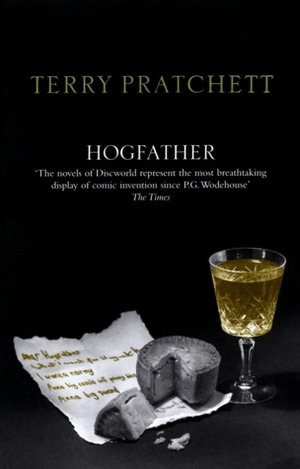
This is part of the Pratchett Project.
The blurb:
Susan had never hung up a stocking . She'd never put a tooth under her pillow in the serious expectation that a dentally inclined fairy would turn up. It wasn't that her parents didn't believe in such things. They didn't need to believe in them. They know they existed. They just wished they didn't.
There are those who believe and those who don't. Through the ages, superstition has had its uses. Nowhere more so than in the Discworld where it's helped to maintain the status quo. Anything that undermines superstition has to be viewed with some caution. There may be consequences, particularly on the last night of the year when the time is turning. When those consequences turn out to be the end of the world, you need to be prepared. You might even want more standing between you and oblivion than a mere slip of a girl — even if she has looked Death in the face on numerous occasions...
It's hard to say which Pratchett line gets quoted most often but the one about humans being the place 'where the falling angel meets the rising ape' is surely in the top three. The bit about the sharp sword being educational is probably top ten.
Christmas stories — even substitute Christmas stories — run the risk of descending pretty rapidly into schmaltz. A psychopathic assassin (one even a little too psycho for the Assassin's Guild, really) is a pretty solid antidote to any saccharine, not that Pratchett falls back on anything so cheap anyway.
The Auditors of Reality are back and explained in a little more depth this time — it's not merely Death they can't stand, it's disorder in any form. They'd be much happier, Death notes, if the universe was just a bunch of rocks orbiting suns without any of that pesky, messy Life happening around them. Their latest target for pruning is the Hogfather, Discworld's analogue of Father Christmas. They contract the Assassin's Guild to kill the Hogfather; the Guild assigns the job to Mr Teatime (it's pronounced 'Tee-ah Tim-eh', he will remind you. If he has to remind you a second time, he'll probably kill you instead), because he'd already thought of a way of doing it, just to fill up his spare time. He's that kind of guy.
The race in Hogfather isn't to prevent the crime — Teatime's method works — it's for the good guys to work out what he's done and to undo it. While Death takes the Hogfather's place, complete with pillow-stuffed robe and fake beard, he absolutely forbids Susan, his granddaughter, from getting involved. Susan is now grown up (some years have passed since Soul Music, when she was still at school), and is very sensible, so she very sensibly tackles the task of finding out what the hell is going on.
Death's adventures as the Hogfather are at once amusing (imagine someone who has a theoretical understanding of human emotions and customs but hasn't really ever experienced them himself dealing with Christmas) and heartbreaking (imagine someone who has a theoretical understanding of human emotions and customs...). Being the 'real' Hogfather at a department store causes chaos because suddenly there are real boars instead of the cute pink cartoon piggies (the children are uniformly amused by the boars weeing on the floor), and he's giving the children what they really want for Hogswatch. There's a very pointed bit about how to do charity well — give people what they want/need, not what you want to give them to make yourself feel good about your giving. And there are the heartbreaking moments where Albert tries to explain to Death that, yes, Hogswatchnight is all about peace and goodwill but yes, people still die in poverty. It's a testament to Pratchett that these all feel consistent with the same characters, and none feel preachy.
The Unseen University wizards pop into the story, dealing with the excess of belief that's floating around now that the Hogfather is no longer a factor; his absence means the excess belief keeps bringing new minor entities into existence e.g. the oh god of hangovers, the natural counterpoint to any god of excess. Susan acquires Bilious (said oh god) as a temporary sort of sidekick, and goes in search of the Hogfather's fate.
Any author writing about the powers of belief and myths seems to swing a little extra weight, and Pratchett certainly does here. The idea that belief — faith — is necessary for humanity to reach its best isn't a new one, but here, it's eloquent in its expression — that we need to believe in the little lies in order to belive in the big ones, like justice and right. The fact that justice isn't something that naturally occurs in the universe is not a new concept for Discworld either (see "there's no justice, just us" in previous books), but it's true; there's only what we make. We can make it a fairer, better world...or we can not do that. It's up to us. Given everything that's going on in the world at the moment, that feels particularly essential to remember right now.
Started: 13 February 2025
Finished: 19 February 2025
Back home.
More books.
More from the Pratchett Project.